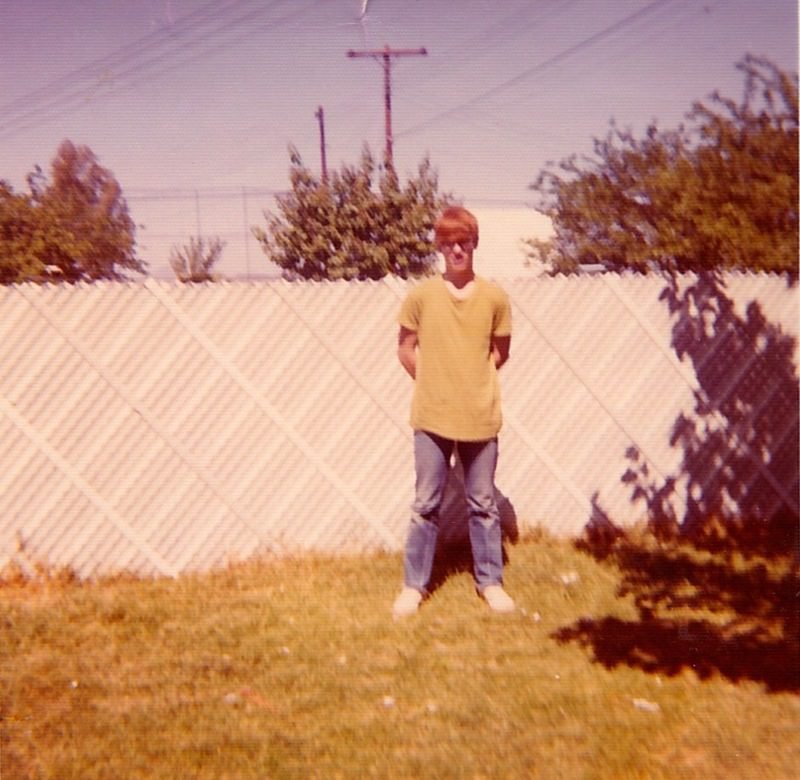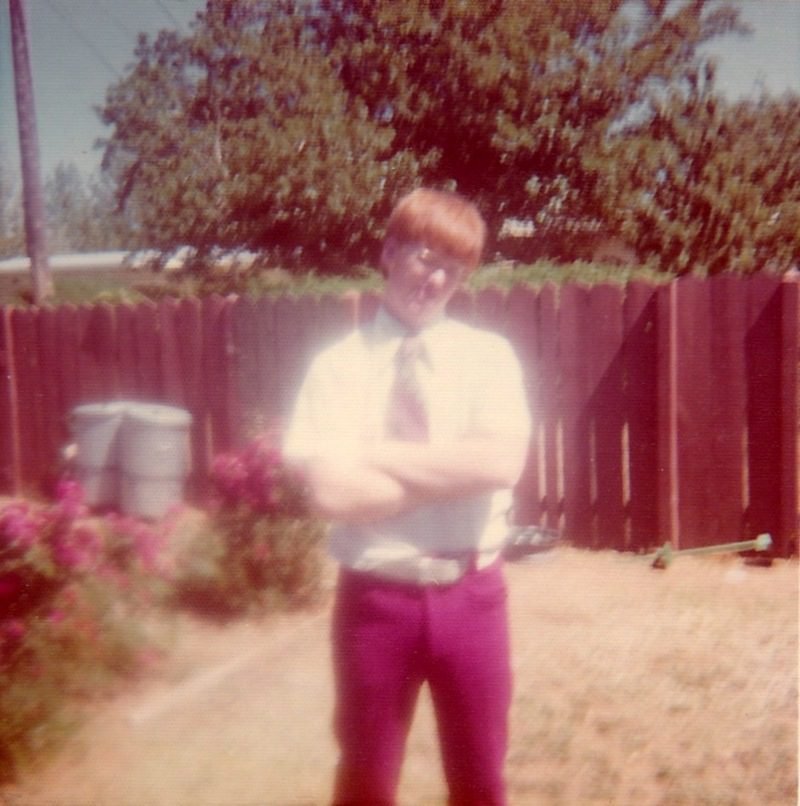
Several weeks ago, Evangelical troll Victor Justice shockingly alleged that I tried to murder my father’s wife. Is Justice right?
In April 1972, my Independent Fundamentalist Baptist (IFB) parents divorced after fifteen years of marriage. I was fourteen. Both of them remarried several months later. Mom married her first cousin, a recent parolee from the Texas prison system. Dad married a nineteen-year-old girl with a toddler. Dad had met her at the local dirt track — Millstream Speedway — where she was the trophy girl.
My younger sister and I lived with Dad after the divorce. My younger brother lived with Mom for a time, though a few months later he returned home due to the danger and volatility in Mom’s home. We would, over the next four years, move between Dad’s and Mom’s homes as children of divorced parents often do. From the time of their divorce in 1972 to when I went to college in 1976, I lived with Dad three times for about twenty-six months, and with Mom three times for the balance of the time, save for living my eleventh-grade year with a family in the church we were attending when Mom and Dad divorced. I was living with Mom when I left for Midwestern Baptist College in August 1976.
Dad brought his new wife into our home, thinking that she would become our new mother. While I cannot speak for my siblings, I can say that this was a gross miscalculation on my father’s part. I didn’t need a new mother, I already had one. She was nineteen and I was almost fifteen. In three years, I would be in a serious relationship with a woman her age. (Please see 1975: Anita, My First Love.) There was no chance that she could EVER be my mother. As a result, we never bonded. This led to an adversarial relationship between us. She was thrilled when I moved home to Ohio to live with my mom; but not so thrilled when I moved back.
In March 1972, Dad abruptly informed my siblings and me that we were moving to Tucson, Arizona. We had no say in the matter. Overnight, Dad had our household goods auctioned off, packed up his two cars, and moved us in the night to Tucson. After arriving in Tucson, I learned that the real reason that we moved is that Dad had creditors chasing him — a scenario I experienced most of my young life. Dad was a wheeler dealer and could be, at times, a con man. As a district manager for Combined Insurance Company, Dad embezzled $10,000. Dad was investigated by the ATF for illegal firearm sales, and was even investigated by the FBI as a possible suspect in a bank robbery (which was unfounded). Throw in unpaid rent, utilities, and other debts, and life was definitely “interesting” for the Gerencser children. When people ask me if I moved a lot growing up because of Dad’s job, I reply, no, we moved all the time because Dad didn’t pay the rent.
After settling into our new home in Tucson, I set about carving out a new life in the desert. During the week, I was a tenth-grade student at Rincon High School. This was the first school where I experienced racial diversity. On Sundays and Wednesdays nights, I walked to the Tucson Baptist Temple to attend services. Neither my father, his wife, nor my siblings attended church. I tried to avoid interaction with my dad’s wife, but conflict was inevitable.

One Sunday, I came home from church and walked into our home. Dad was working on Speedway Boulevard selling carpet. His wife and I had words. I don’t remember what the issue was. It didn’t matter. We always had words. All of a sudden, my dad’s wife picked up a leather belt and hit me in the face. I retaliated by picking her up and throwing her into a cement block wall, knocking her out. I left her lying on the floor and walked to where dad worked and told him what happened. He rushed home and took his wife to the hospital. She had a fractured back.
I could have been arrested for assault. Fortunately, that didn’t happen. Neither my dad’s wife nor I talked about the incident afterward. Both of us understood we were wrong to do what we did. Our relationship changed after that. We both stayed away from each other. A couple of months later, I moved back to my mom’s home in Bryan, Ohio. By the time I returned to Arizona in November 1974, Dad and his wife had moved to Sierra Vista. I spent very little time at home, busying myself with my job as a stock clerk for Food Giant, church three times a week and working a bus route on Sundays, and roaming southeast Arizona with my girlfriend. I also worked part-time at my dad’s gun store and manned Dad’s table at various gun shows. My life was busy, which was good, since it meant I spent very little time with Dad’s wife.
In the fall of 1975, I moved back to my mom’s home. Outside of my marriage to Polly in 1978, I would not see or speak to Dad’s wife again. We had a brief email exchange in the early 2000s, but I have no recollection of what we talked about.
Was it wrong for me to throw my dad’s wife into a block wall? Absolutely. I am grateful that I didn’t end up in jail. All of us do dumb things; things that can have catastrophic consequences. On my dad’s wife’s part, hitting me in the face with a belt was child abuse or assault. What happened was the result of a hostile relationship driven by anger. Both of us were lucky to avoid the consequences of our behavior.
Did I intend to murder my dad’s wife? Of course not, and it is absurd to suggest otherwise. Could my actions have caused her death? Absolutely. That’s what happens when anger and rage take over. When passions are enflamed, anything is possible. I visited numerous murderers in local and state prisons. Most of their crimes had a flash point. One boy killed his dad over an argument they had; another killed his friend with a shotgun because they had a disagreement over who should pay for a pizza. We humans can do awful things when sense and rationality go out the window. If I learned one thing it is this: when you find yourself angry or enraged with someone, walk away. Don’t put yourself in a position where something tragic could happen.
An attempted murderer I am not. There was a time when I was a young, temperamental boy who was placed in living situations that were challenging and difficult. The adults in my life were, for the most part, AWOL, leaving me to fend for myself. Even my pastors paid very little attention to what was going on in my life. That’s life, is it not? That’s why it is crucial that children have loving parents who are there for them. Not helicopters, but a guiding presence as they navigate life. My parents were broken from the start, as was their marriage. They did what they could, but their dysfunction had real-world consequences in the lives of their children. I have made peace with my past, and have tried my best to be a good husband, father, and grandfather. Without a doubt, I have failed many times. All I know to do is learn from my past and do better today.
Bruce Gerencser, 68, lives in rural Northwest Ohio with his wife of 47 years. He and his wife have six grown children and sixteen grandchildren. Bruce pastored Evangelical churches for twenty-five years in Ohio, Texas, and Michigan. Bruce left the ministry in 2005, and in 2008 he left Christianity. Bruce is now a humanist and an atheist.
Your comments are welcome and appreciated. All first-time comments are moderated. Please read the commenting rules before commenting.
You can email Bruce via the Contact Form.
